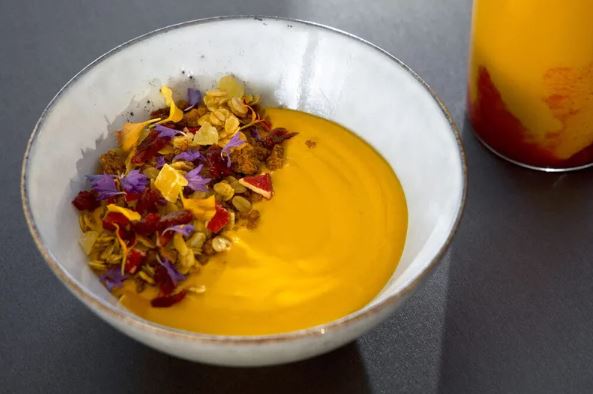Finland: As conventional farming methods evolve, a revolutionary food source known as "air protein" is making headlines. Developed by Solar Foods, Solein is a cutting-edge protein derived from carbon dioxide, nitrogen, and hydrogen. This innovative process, similar to beer brewing but using gas fermentation, converts these gases into a protein-rich powder. The result: a sustainable alternative to both meat and traditional plant-based proteins. Photo Credits: Solein Finland
The Creation of Solein
Solein's production is a marvel of modern science and environmental responsibility. The process begins with a unique microbe that consumes carbon dioxide, nitrogen, and hydrogen, which are readily available in the atmosphere. Renewable energy is used to split water molecules, providing hydrogen, which is then combined with the other gases in a nutrient-rich broth. As the microbes grow and multiply, they are harvested and dried into a fine powder containing about 60-70% protein. This powder can be transformed into various food products, from flakes to chunks, mimicking traditional meats.
Challenges and Safety Concerns
Despite its potential, Solein faces several hurdles. Currently, it is only approved for sale in Singapore, with major markets like the U.S. and Europe still assessing its safety and efficacy. The production process involves hydrogen, a highly explosive gas, which presents significant safety challenges. Solar Foods is implementing stringent safety measures to manage hydrogen, but scaling up production remains a complex task.
Moreover, as a new food product, Solein lacks extensive long-term studies on its health effects. While it is high in protein, vegan-friendly, and allergen-free, more research is needed to fully understand its long-term impact on human health.
Environmental and Nutritional Benefits
One of Solein's most compelling features is its minimal environmental footprint. Solar Foods claims that Solein is up to 10 times more climate-friendly than most plant-based proteins and approximately 100 times more sustainable than meat, particularly beef. It requires significantly less water and land compared to traditional agriculture, making it a promising solution for a growing global population.
Nutritionally, Solein is versatile and caters to various dietary needs. It is free from gluten, dairy, and soy, and contains all nine essential amino acids, along with carbohydrates, fats, and minerals. This makes it a comprehensive protein source that could rival existing options in terms of nutrition.

Looking Ahead
The journey of Solein from the lab to the dinner table is just beginning. While it holds great promise as a sustainable food source, it must overcome regulatory and safety challenges before becoming a mainstream option. If Solar Foods can successfully address these issues, Solein could transform food production, offering a low-carbon, high-protein alternative that aligns with future nutritional needs.
As the world continues to tackle climate change and food security issues, Solein might emerge as a key player in the sustainable food landscape, potentially reshaping how we feed ourselves while reducing our environmental impact.